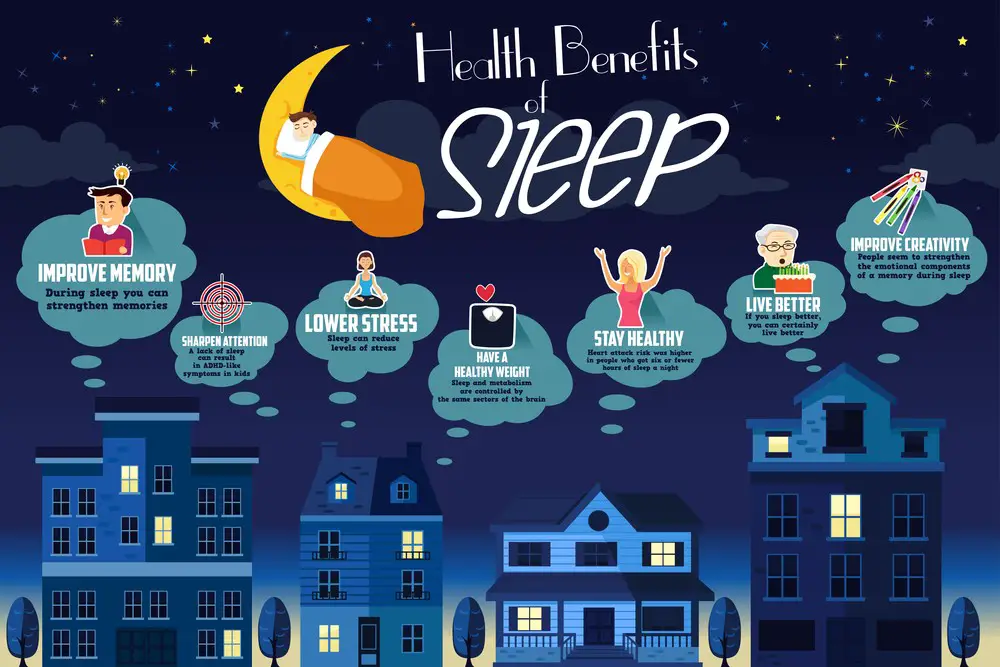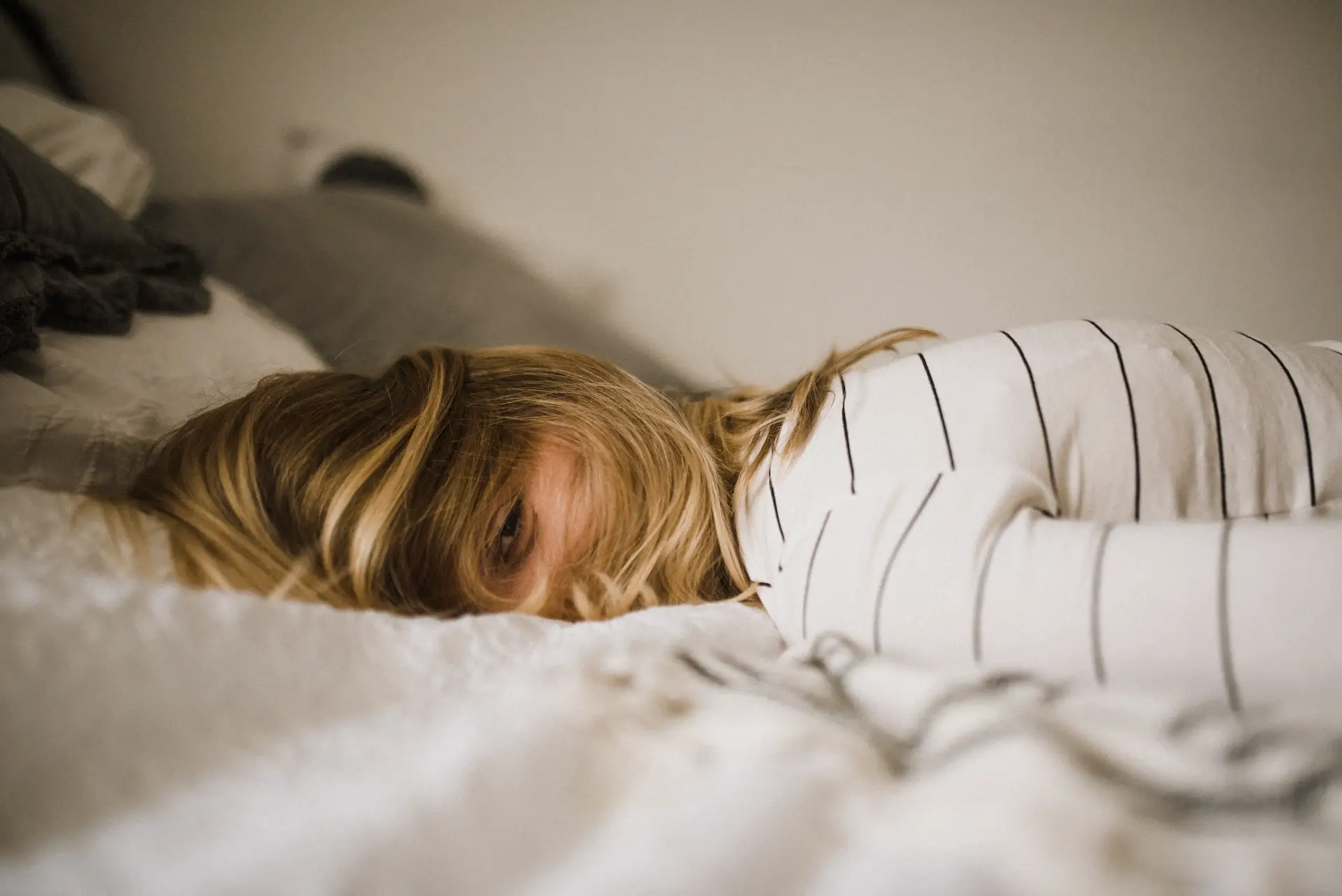As a BetterHelp affiliate, we receive compensation from BetterHelp if you purchase products or services through the links provided
Feeling tired but unable to sleep is a common issue that many people experience at some point in their lives. This situation, characterized by fatigue followed by insomnia, can be frustrating and negatively impact one’s physical and emotional well-being. Several factors may contribute to this paradoxical condition, including physical, psychological, and environmental causes.
Some common physical reasons for feeling fatigued but having trouble falling asleep may include an imbalanced diet, lack of exercise, or underlying health conditions. Psychological factors, such as stress, anxiety, and depression, can also play a significant role in this conundrum. It’s essential to examine these aspects and one’s daily habits and sleep environment to understand better and address the underlying causes.
A comprehensive approach is necessary to address fatigue and insomnia to improve overall health and well-being. If necessary, this may involve lifestyle changes, stress management techniques, and medical assistance. It’s also crucial to recognize the potential impact of these issues on daily life and take precautions to minimize negative consequences.
Key Takeaways
- Fatigue, followed by insomnia, can be caused by various physical, psychological, and environmental factors.
- Addressing the issue requires a comprehensive approach, including lifestyle changes and stress management.
- Understanding the impact and taking precautions are essential to minimize negative consequences on daily life.
Common Causes for Fatigue and Insomnia
Lack of Sleep and Poor Sleep Quality
Fatigue and insomnia can often be attributed to a lack of sleep or poor sleep quality. Not getting enough hours of sleep or experiencing disruptions during sleep can lead to feeling tired but unable to fall asleep. Sleep quality factors include noise, uncomfortable temperatures, and electronic device usage before bedtime. Maintaining good sleep hygiene, like maintaining a consistent sleep schedule and creating a relaxing bedtime environment, can help improve sleep quality.
Medical Conditions and Sleep Disorders
Certain medical conditions, such as sleep apnea or restless leg syndrome, can cause fatigue and insomnia. Sleep apnea, a common sleep disorder, leads to shallow or interrupted breathing during sleep, making it difficult for people to rest. Healthcare professionals can diagnose and treat these conditions to help alleviate fatigue and sleep issues.
Lifestyle and Environmental Factors
Lifestyle and environmental factors also contribute to fatigue and insomnia. Consuming caffeine too close to bedtime can interfere with the body’s natural circadian rhythm, resulting in difficulty falling asleep. Other factors that impact sleep include:
- Exposure to light during the evening, which suppresses melatonin production
- Lack of physical activity during the day
- Consumption of alcohol or nicotine
Making adjustments to daily habits and surroundings can improve sleep and reduce fatigue.
Stress, Anxiety, and Depression
Mental health issues, such as stress, anxiety, and depression, can significantly impact sleep. These conditions can lead to racing thoughts, excessive worry, or a low mood, making falling or remaining asleep difficult. Seeking professional help for mental health concerns and practicing relaxation techniques, such as deep breathing or meditation, can help manage stress, anxiety, and depression to promote better sleep.
Addressing Fatigue and Insomnia
Improving Sleep Hygiene and Habits
One common cause of fatigue and insomnia is poor sleep hygiene. It’s essential to establish a sleep schedule by going to bed and waking up at the same time every day, even on weekends. Limit exposure to blue light from devices like smartphones, tablets, and computer screens before bedtime, as it can disrupt circadian rhythms, making it difficult to fall asleep. Reducing caffeine consumption, especially in the afternoon and evening, can also improve sleep quality.
Coping Strategies for Stress and Anxiety
Stress and anxiety might contribute to fatigue and insomnia. Some coping strategies include relaxation techniques like deep breathing, progressive muscle relaxation, or meditation. Practicing yoga is another option that can help manage stress and promote relaxation. Taking a break or walking during lunch can also help alleviate stress levels during the workday.
Medical Treatments and Therapies
For individuals experiencing chronic insomnia, exploring medical treatments and therapies might be beneficial. Melatonin supplements can be helpful for some individuals, particularly when dealing with jet lag or disruptions to the circadian rhythm. Prescription sleep medications might also be an option, but they should only be used under a doctor’s supervision. Cognitive-behavioral therapy for insomnia (CBT-I) is an evidence-based treatment that addresses the underlying causes of poor sleep.
Lifestyle Changes
Certain lifestyle changes can help address the issue of being tired but unable to sleep. Make sure to get enough physical activity during the day since exercise has been shown to improve sleep quality. Stick to a consistent meal schedule, eating dinner several hours before bedtime. Limit alcohol intake, interrupting the sleep cycle and contributing to poor sleep.
Implementing Relaxation Techniques
In addition to coping strategies for stress and anxiety, implementing relaxation techniques into the daily routine can help manage insomnia. Consider setting aside 20-30 minutes daily for relaxation practices like meditation, guided imagery, or deep breathing exercises. These techniques can lower cortisol levels, reduce inflammation, and promote a healthy immune system, ultimately improving sleep quality.
Impact and Precautions
Effects of Sleep Deprivation on Health and Well-Being
Feeling tired but unable to sleep can be a symptom of various medical conditions, such as restless legs syndrome, sleep disorders, or even heart disease. This constant tiredness can adversely affect an individual’s physical and mental well-being. According to the Centers for Disease Control and Prevention, inadequate sleep can lead to a range of health problems, including:
- Irritability: A person may experience mood swings and lowered emotional resilience, making it harder to manage stress.
- Memory and cognitive decline: Chronic sleep deprivation can impair memory and cognitive function, leading to errors and reduced productivity.
- Increased risk of accidents: A lack of sleep leads to daytime sleepiness, which can cause an increase in accidents and injuries.
- Worsened mental health conditions: Existing anxiety disorders or other mental health issues may be exacerbated by sleep deprivation.
- Chronic pain: Prolonged lack of sleep can contribute to prolonged pain, such as headaches.
Additionally, research advancements have shown links between sleep deprivation and illnesses such as diabetes due to the disrupted internal clock and changes in blood sugar regulation.

Identifying Warning Signs and Seeking Professional Help
Recognizing the warning signs of sleep problems and seeking professional help when necessary is crucial. Some common signs of sleep issues include:
- Excessive daytime sleepiness: Feeling consistently tired during the day, despite getting enough sleep at night.
- Frequent nighttime awakenings: Waking up multiple times during the night or having difficulty falling back asleep.
- Restless legs syndrome: An irresistible urge to move one’s legs, especially at night.
- Shift work sleep disorder: Difficulty adapting to a nocturnal work schedule, leading to insomnia or excessive sleepiness.
- Narcolepsy: Sudden and uncontrollable episodes of falling asleep during the day.
- Sleep-related breathing disorders: Snoring, gasping, or pauses in breathing during sleep.
If these signs are present, consult a healthcare provider specializing in sleep disorders. They may recommend treatments such as cognitive behavioral therapy or changes in lifestyle habits.
Some health tips for managing and improving sleep quality include:
- Setting a consistent sleep schedule and sticking to it, even on weekends.
- Creating a relaxing bedtime routine, such as a warm bath or reading a book.
- Avoiding large meals, caffeine, and alcohol close to bedtime.
- Turning off electronic devices or using blue-light-blocking glasses to limit exposure to stimulating light before bedtime.
- Establishing a comfortable and relaxing sleep environment, free from noise and excessive light.
- Prioritizing daily exercise and engaging in relaxation techniques, such as meditation or deep breathing, to lower stress levels.
In conclusion, understanding the impact of sleep deprivation on one’s health, identifying the warning signs, and seeking professional help are essential to maintain overall well-being.

Frequently Asked Questions
Lying in bed but can’t sleep?
It is not uncommon for someone to lie in bed but be unable to fall asleep. This can be due to various factors, such as stress, anxiety, or an uncomfortable sleeping environment. Try incorporating relaxation techniques, like deep breathing exercises or meditation, to help ease your mind. Ensure your bedroom is cool, dark, and quiet to support a comfortable sleeping space.
I am not tired despite sleep deprivation.
Sometimes, an individual may feel wide awake even when they are sleep-deprived. This can result from the body’s stress response or stimulating activities before bedtime. Establish a consistent bedtime routine and limit exposure to screens or other stimulants before sleep.
Waht if I can’t sleep at night but can during the day?
Difficulty sleeping at night but being able to sleep during the day can be a sign of a disrupted circadian rhythm. To help shift your sleep schedule, expose yourself to natural light during the day and limit exposure to artificial light at night. Additionally, set a consistent sleep schedule and avoid napping during the day.
What if I am unable to sleep for days?
If you cannot sleep for several nights, you may be experiencing insomnia. Insomnia can have various causes, such as stress, medical conditions, or substance use. It is critical to consult a healthcare professional for an accurate evaluation and appropriate recommendations for treatment.
How to force sleep?
Trying to force yourself to sleep is not advisable, as this can often lead to increased stress and anxiety. Instead, try incorporating relaxation techniques, like progressive muscle relaxation, and maintain a consistent bedtime routine. If you continue to experience difficulty falling asleep, consider seeking professional advice.
Dealing with overtiredness
Overtiredness can make it challenging to fall asleep and can negatively impact the quality of one’s sleep. Focus on establishing healthy sleep habits, such as sticking to a consistent sleep schedule, creating an optimal sleep environment, and avoiding caffeine or other stimulants close to bedtime. If symptoms of overtiredness persist, it may be necessary to consult a healthcare professional for further guidance.
- 7 Ideas to Help You Relax and Unwind on a Family Vacation - April 27, 2025
- How Having Cybersecurity Protection Helps You Relax - April 25, 2025
- 8 Reasons Why Spending Time Outside Calms You Down - April 25, 2025
This site contains affiliate links to products. We will receive a commission for purchases made through these links.



